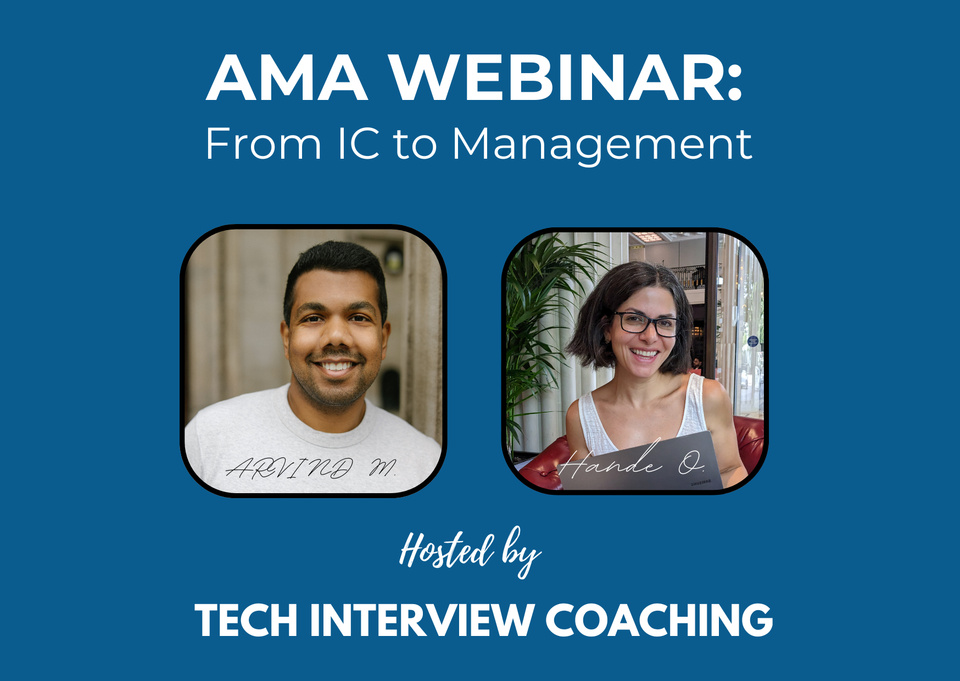
How to Transition from Individual Contributor to Manager: Key Insights from Arvind Muthukumar
Transitioning from an individual contributor (IC) to a management role is one of the most significant career shifts in the tech industry. In our webinar series “The Final Round” hosted by Tech Interview Coaching; Arvind Muthukumar, shared his insights and advice on making this transition successfully.
About the author: Engineering Manager at Deliveroo, ex-Amazon, coach, and mentor empowering tech talent. Book time with them here.

Transitioning from an individual contributor (IC) to a management role is one of the most significant career shifts in the tech industry. It’s a journey filled with challenges, learning curves, and opportunities for growth. In our webinar series “The Final Round” hosted by Tech Interview Coaching, I, Arvind Muthukumar, an experienced Engineering Manager at Deliveroo and former Amazonian, shared my insights and advice on making this transition successfully.
Here are the key takeaways from my webinar:
Why Transition to Management?
I emphasized that the decision to move into management should be driven by your motivations and strengths. For me, the desire to solve complex problems at scale and empower others to grow were the key drivers.
Scaling Impact: As a manager, you can amplify your impact by enabling your team to solve multiple problems simultaneously.
Empowering Others: If you enjoy mentoring and helping others succeed, management can be a fulfilling path.
Business Influence: Managers often have a broader influence on business decisions, allowing them to shape the direction of the company.
However, I cautioned that management isn’t for everyone. It’s important to reflect on whether the role aligns with your long-term goals and strengths.
The Biggest Challenges in Transitioning
Transitioning from an IC to a manager comes with its own set of challenges. I highlighted a few key ones:
Mindset Shift: Moving from being responsible for your own work to being accountable for your team’s success requires a significant mindset shift.
Dealing with Failure: As a manager, you need to separate personal failure from team failure. For example, losing a team member isn’t necessarily a failure - it’s about aligning individual goals with the team’s vision.
Time Management: Managers juggle multiple responsibilities, from team development to stakeholder management. Learning to prioritize and delegate effectively is crucial.
Building Credibility as a New Manager
One of the trickiest aspects of transitioning to management is establishing credibility, especially if you’re managing former peers. I shared my experience of becoming a manager within the same team at Amazon.
Leverage Existing Trust: Use the trust you’ve already built as an IC to start your managerial journey.
Focus on Team Pain Points: As a former IC, you likely understand the team’s challenges better than an external hire. Use this insight to drive improvements.
Be Humble and Open: Regularly seek feedback from your team and be transparent about your learning process.
The Importance of Mentorship and Feedback
I stressed the value of having mentors during the transition. I recommended having:
A Day-to-Day Mentor: Someone within your organization who can guide you through real-time challenges.
An External Mentor: Someone outside your immediate work environment who can offer a fresh perspective.
Additionally, I highlighted the importance of regular one-on-one meetings with your team to understand their needs and provide constructive feedback.
Common Mistakes New Managers Make
I pointed out some common pitfalls new managers face:
Not Delegating Enough: Many new managers struggle to let go of execution tasks, which can hinder their ability to focus on strategic priorities.
Falling Back into an IC Mindset: If you find yourself spending too much time on execution, it’s a sign you’re slipping back into an IC role.
Overprotecting the Team: While it’s important to support your team, allowing them to fail in small ways fosters growth and resilience.
Tools and Resources for Success
I shared some of the tools and books that helped me succeed as a manager:
Trello: For tracking team deliverables and managing priorities.
Books That Won’t Put You to Sleep:
The Manager’s Path by Camille Fournier: A guide to navigating the challenges of engineering management.
Start With Why by Simon Sinek: A book on leadership and creating purpose for your team.
Atomic Habits by James Clear: A framework for building effective habits and achieving long-term goals.
Final Advice for Aspiring Managers
My parting advice for those considering a management role:
Try It Out: Management isn’t a one-way door. If it doesn’t work out, you can always return to an IC role with valuable experience.
Focus on Long-Term Growth: Invest time in developing your team’s skills and empowering them to succeed independently.
Stay Curious: Continuously seek opportunities to learn and grow, both from your team and your mentors.
Watch the Full Webinar
Whether you’re an IC considering a management role or already on the path, my advice offers valuable guidance for navigating this challenging yet rewarding transition.
Want Arvind Muthukumar’s unfiltered take on salary negotiations and surviving your first board meeting? Watch the full session below.
About the author: Arvind Muthukumar
Engineering Manager at Deliveroo, ex-Amazon, coach, and mentor empowering tech talent. Book time with them here.
Get Started
Linkedin & Resume Makeover
We will optimize your Resume & LinkedIn with our expert review & rewrite services.
Coaching Sessions
Our coaches will work with you on detailed, tailored sessions to get you ready for any challenge.
Negotiation Support
We will be by your side to review your contract & negotiate the salary you deserve.
Client Testimonials
Success stories from professionals who transformed their careers

"Hande's coaching was transformative. She didn't just help me prepare for Amazon's rigorous interviews—she made the process human, boostin..."

"All coaches gave me great tools to boost my confidence for my next interview process. Would definitely recommend."

"Interesting design problem, as always good advices regarding behavioural questions. A very good test before actually doing an interview o..."

"The lessons and guidance were appropriate to my needs and the expertise was thorough. The coaching was effective with homework. I landed ..."

"My coach was very helpful with insights on what I should focus on going into my phone interview."

"Arpitha is a truly fantastic coach, and helped tremendously with every aspect of the interview preparation, knowing what I need to focus ..."

"I am extremely grateful for the time and effort that Andrea invested in helping me improve my system design interview skills, and I would..."

"The Team of Andrea, Hande & Arpitha has been so good to me over the last fortnight they are incredibly accommodating to adapt to your sch..."
Ready to achieve similar results?
Find Your CoachSchedule your free consultation
Pick a time that works for you. In a short intro we’ll understand your goals and map out a plan to win offers.
- Quick intro (15–20 min) — no prep needed
- Share your target roles and timeline
- Get a personalized prep plan and next steps
- We’ll suggest the best coach to start with



